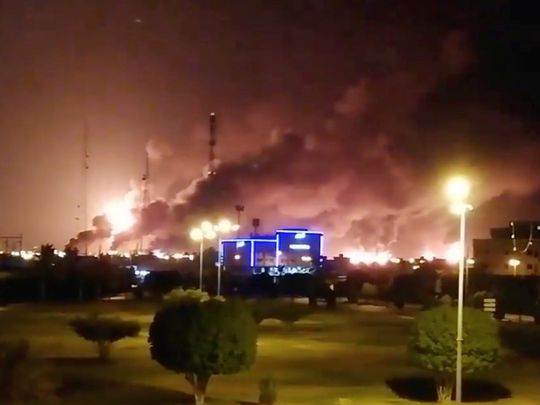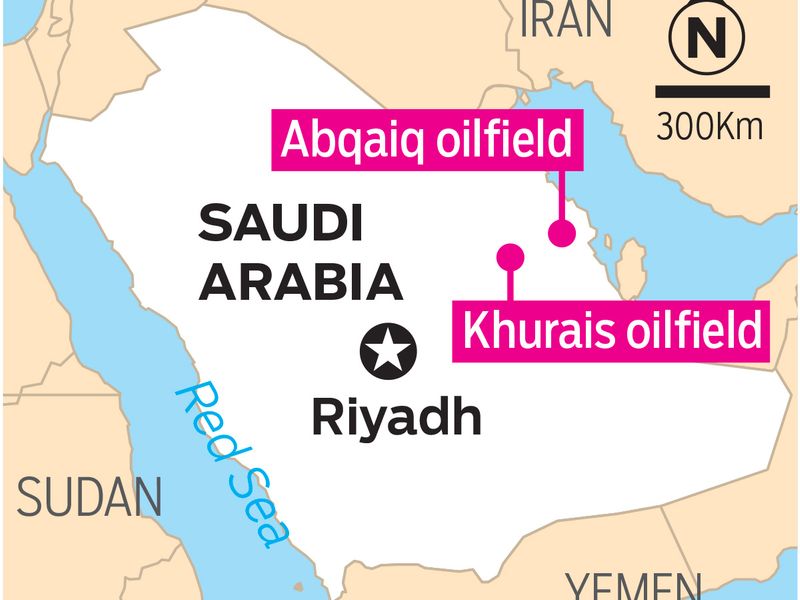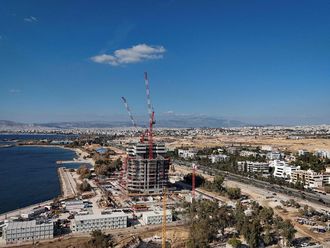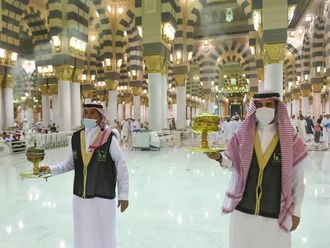
Dubai: Yemen's Houthi rebels launched drone attacks on the world's largest oil processing facility in Saudi Arabia and a major oil field Saturday, sparking huge fires and halting about half of the supplies from the world's largest exporter of oil.
The pre-dawn drone attack on the Saudi Aramco facilities sparked several fires. The blasts took place at 3:31am and 3:42 am at the two locations, both in the Eastern Province of Saudi Arabia, causing fires that were brought under control by emergency services.
The attacks were the latest of many drone assaults on the kingdom's oil infrastructure in recent weeks, but easily the most damaging. They raise concerns about the global oil supply and likely will further increase tensions across the Gulf amid an escalating crisis between the U.S. and Iran over its unraveling nuclear deal with world powers.
Oil and gas production suspended
The attacks resulted in "the temporary suspension of production operations" at the Abqaiq oil processing facility and the Khurais oil field, Energy Minister Prince Abdulaziz bin Salman said in a statement carried by the state-run Saudi Press Agency.
Prince Abdulaziz Bin Salman said as a result of the terrorist acts, oil production in Abqaiq and Khurais was knocked out temporarily and that estimates show that 50 percent of the company’s production had been interrupted.
The fires "were controlled," the statement said, and no workers were injured.

Abqaiq is 60 km southwest of Aramco's Dhahran headquarters.
The oil processing plant handles crude from the world's largest conventional oilfield, the supergiant Ghawar, and for export to terminals Ras Tanura — the world's biggest offshore oil loading facility — and Juaymah.
It also pumps westwards across the kingdom to Red Sea export terminals.
Two of the sources said Ghawar was flaring gas after the strikes disrupted gas processing facilities. Khurais, 190 km further southwest, contains the country's second largest oilfield.
Many Western employees of Aramco live in Abqaiq.
Interruption
The fires led to the interruption of an estimated 5.7 million barrels in crude supplies, according to the statement, which said part of that would be offset with stockpiles.
The statement said Saudi Aramco, the state-owned oil giant, would provide updated information in the next 48 hours.
Minister added that the blasts also knocked out the production of 2 billion cubic feet of daily associated gas, used to produce 700,000 barrels of natural gas liquids, which will lead to an approximate 50 percent decrease of Ethane and natural gas liquids supply.
Saudi Arabia is the world’s biggest exporter, shipping more than 7 million barrels of oil to global destinations every day, and for years has served as the supplier of last resort to markets.
"Part of the decrease will be compensated to clients through reserves," Prince Abdulaziz said in a statement carried on the Saudi Press Agency.
The newly appointed minister confirmed there were no injuries to staff at the locations targeted, adding that the company is still assessing the resulting damage.
The attacks not only target the Kingdom’s vital installations, but also target the international oil supply and threaten its security, he said, and are a threat to the world economy.
The attacks were the latest of many drone assaults on the kingdom's oil infrastructure in recent weeks, but easily the most damaging. They raise concerns about the global oil supply and likely will further increase tensions across the Gulf amid an escalating crisis between the U.S. and Iran over its unraveling nuclear deal with world powers.
How will world energy supply be affected?
The attacks, which have cut six percent of the world's oil supply, could drive up prices when markets re-open on Monday, but the impact will depend on how quickly the OPEC kingpin can restore production.
Aramco also said it would dip into its stocks to offset the disruption.
The incident could undermine investor confidence in Aramco's looming stock market debut, a mammoth listing that the government hopes will raise up to $100 billion based on a $2 trillion valuation of the company.
Attacks suspected not from Yemen
The Iranian-backed Houthis, who hold Yemen's capital, Sanaa, took responsibility for the attacks.
U.S. Secretary of State Mike Pompeo accused Iran of being behind the attacks, ruling out Yemeni involvement and denouncing Tehran for engaging in false diplomacy.
Secretary of State Mike Pompeo tweeting "There is no evidence the attacks came from Yemen." Adding "Iran has now launched an unprecedented attack on the world's energy supply".
He dismissed a claim by Yemeni Houthi rebels that they had attacked the two facilities.
If the rebels were responsible for the attacks, their drones would have had to fly hundreds of miles from Yemen into central Saudi Arabia.
Meanwhile experts are investigating whether the attacks could have been carried out from the north - either by Iran or its Shia allies in Iraq - using cruise missiles rather than drones, the Wall Street Journal reports.
President Donald Trump called Saudi Arabia's Crown Prince Mohammed bin Salman to offer his support for the kingdom's defense, the White House said. The crown prince assured Trump that Saudi Arabia is "willing and able to confront and deal with this terrorist aggression," according to a news release from the Saudi Embassy in Washington.
Iran praised the attack
In a short address aired by the Houthi's Al-Masirah satellite news channel, military spokesman Yahia Sarie said the rebels launched 10 drones after receiving "intelligence" support from those inside the kingdom.
He warned that attacks by the rebels would only get worse if the war continues.
"The only option for the Saudi government is to stop attacking us," Sarie said.
The chief of Iran's elite Quds Force, Qassem Soleimani praised the Houthis for their resistance in a Twitter post.
While Iran's foreign ministry on Sunday dismissed as "meaningless" the US accusations that it was behind the drone attacks on Saudi oil installations, suggesting they were a pretext to retaliate against the Islamic republic.
"Such fruitless and blind accusations and remarks are incomprehensible and meaningless," ministry spokesman Abbas Mousavi was quoted as saying in a statement.
The allegations over Saturday's strikes were meant to justify "future actions" against Iran, he added.
Tensions in the region have escalated in recent months after the United States quit an international nuclear deal and extended economic sanctions on Iran.
Fellow Gulf OPEC producers the United Arab Emirates and Kuwait voiced support for any measures by Saudi Arabia to safeguard its security.
Markets
The facility processes sour crude oil into sweet crude, then transports it onto transshipment points on the Gulf and the Red Sea or to refineries for local production. Estimates suggest it can process up to 7 million barrels of crude oil a day. By comparison, Saudi Arabia produced 9.65 million barrels of crude oil a day in July.
"This is one of the biggest central processing facilities in the world. The Iran conflict is going to be hitting the world in a new way," said Kevin Book, managing director, research at ClearView Energy Partners LLC.
"Abqaiq is the heart of the system and they just had a heart attack," said Roger Diwan, a veteran OPEC watcher at consultant IHS Markit. "We just don't know the severity."
The Khurais oil field is believed to produce over 1 million barrels of crude oil a day. It has estimated reserves of over 20 billion barrels of oil, according to Aramco.
There was no immediate impact on global oil prices as markets were closed for the weekend. Benchmark Brent crude had been trading at just above $60 a barrel.
Impact on Aramco
The attacks came as Aramco, officially known as Saudi Arabian Oil Co., is speeding up preparations for an initial public offering. The company has selected banks for the share sale and may list as soon as November, people familiar with the matter have said.
Attacks on Saudi Arabia's oil facilities may impact Aramco's valuation but are unlikely to derail the kingdom's plan to sell shares in the oil giant, according to the Eurasia Group.
"Crown Prince Mohammad bin Salman will push the company to demonstrate that it can effectively tackle terrorism or war challenges," analysts led by Ayham Kamel, head of Middle East and North Africa research at the Eurasia Group, said in a research report.
"The attacks could complicate Aramco's IPO plans given rising security risks and potential impact on its valuation."








